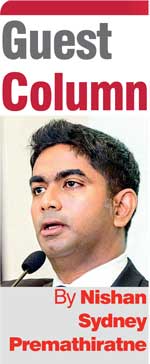Thursday Feb 19, 2026
Thursday Feb 19, 2026
Tuesday, 12 July 2022 00:55 - - {{hitsCtrl.values.hits}}
 There is no provision in the Sri Lankan Constitution for a fresh President to be appointed by a fresh mandate of the people, if the office of President becomes vacant prior to the expiry of the term; the appointment for the remainder of the term is to be by way of a secret ballot through Parliament where Parliament selects one of its members. Whether this is what the people want at this juncture and also whether this process of appointing the new President can be trusted is arguable.
There is no provision in the Sri Lankan Constitution for a fresh President to be appointed by a fresh mandate of the people, if the office of President becomes vacant prior to the expiry of the term; the appointment for the remainder of the term is to be by way of a secret ballot through Parliament where Parliament selects one of its members. Whether this is what the people want at this juncture and also whether this process of appointing the new President can be trusted is arguable.
Where Parliament is dissolved prior to the expiry of the term (subject to a ground in the Constitution), a general election should be thereafter held to form a new Parliament by way of a fresh mandate from the people. However, there is no provision in the Sri Lankan Constitution for a President to be appointed by the people by way of a fresh Presidential election in an instance where the incumbent president resigns.
Article 40 of the Sri Lankan Constitution is clear on this, where the new appointee is to be from Parliament and shall hold office only for the unexpired period of the term of office of the President vacating office. This, unfortunately does not address a situation where the citizens have lost complete confidence in the President’s political party, and such political party also commands the majority in Parliament.
In an instance where the President resigns, as per the Constitution, during the period between the occurrence of such vacancy and the assumption of office by the new President, the Prime Minister shall act in the office of President and shall appoint one of the other Ministers of the Cabinet to act in the office of Prime Minister.
However, if the office of Prime Minister is vacant or the Prime Minister is unable to act, the Speaker shall act in the office of President for limited period of time until Parliament so selects a new president by a secret ballot. Thus, if the Prime Minister’s office is vacant and the President then resigns, the Speaker would so become President.
Reappointing a President from Parliament in the present circumstances might not satisfy the wishes of the people. The appointment is also to be by way of secret ballot. A most likely outcome could be that the newly appointed President would be also from the same political party which commands a majority in Parliament. Whatever agreements reached at all party meetings in respect of forming of an all-party government might be done away with at the vote.
Furthermore, the process of appointment of the new President could be quite dangerous in a political culture such as ours, where extraneous factors could come to play in influencing such appointment and the vote could cut across the peoples’ wishes; an all-powerful President who was never elected by the people could suddenly be appointed to govern for two more years, who as it stands now, will not be substantially accountable to Parliament.
Thus, ideally, it is a must that the Constitution is amended, and a fresh amendment is tabled (doing away with the present proposed 22nd Amendment) to reduce the overwhelming powers of the President. This should be done no sooner the office becomes vacant (after the incumbent President resigns) within such period where the Speaker is holding office as President. A President fully accountable to Parliament is a must and should be created during this period.
Rushing into appointing a new President no sooner the incumbent President resigns without the required amendments to the Constitution would be quite detrimental. In addition, the process of appointing the new President by Parliament could and should in fact be reviewed, and such appointment process amended to fall in line with a concept of a National Government, subject to all such amendments being able to passed by way of two-third majority in Parliament (without a referendum).
(The writer is an Attorney-at-Law who is primarily engaged in Civil and Commercial Law. He holds LLMs in International Commercial and Corporate Law from Kings College, London and an LLM in Law from the Colombo University. He also holds a postgraduate diploma in Intellectual Property Law (IALS) and an LL.B. Hon’s Degree from the University of London and a BSc (Hons) degree in Human Genetics from the University of Nottingham.)